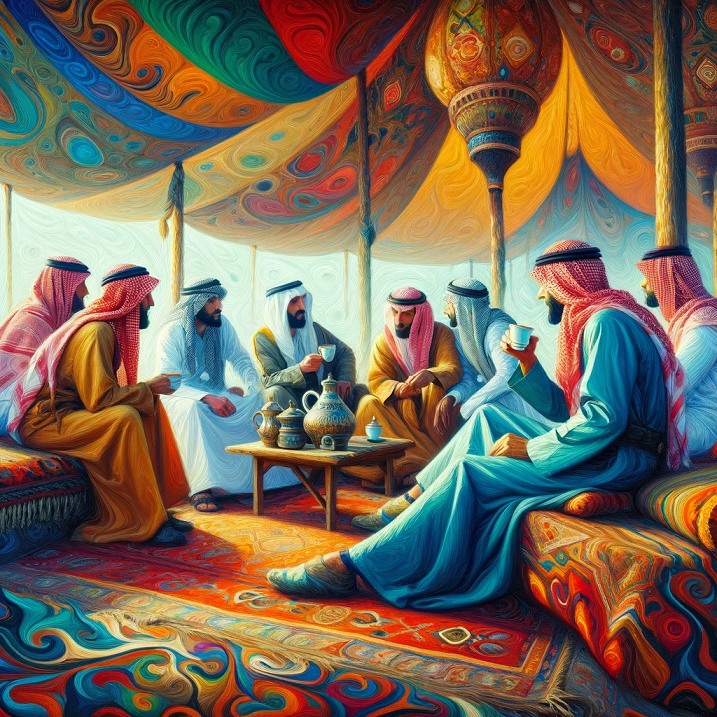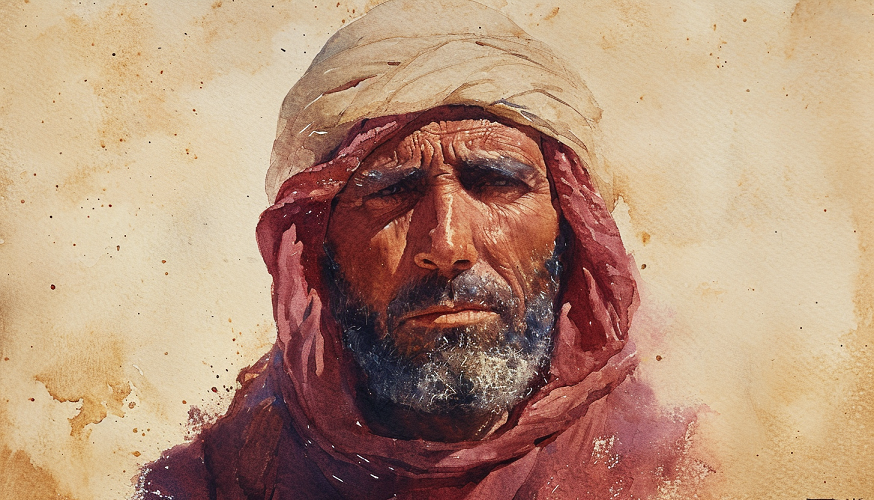H.R.P. Dickson’s ethnographic account, “The Arab of the Desert,” serves as a captivating window into the lives of Bedouin Arabs during the early 20th century, offering a unique perspective on their customs and way of life, particularly in the region of Kuwait. The intricate web of Bedouin traditions, encompassing notions of Arab honour, hospitality, and the sanctity of women, are illuminated by Dickson’s meticulous observations.
Key Takeaways:
- Arab honour is a complex tradition woven into the fabric of Bedouin culture.
- Hospitality is a cornerstone of Bedouin society, extending beyond mere shelter and sustenance.
- The exchange of gifts symbolizes trust and camaraderie among hosts and guests.
- The Salt Bond embodies sacred trust and mutual protection between hosts and guests.
- Divorces among Bedouin are less severe, with divorced women finding new suitors easily.
- Divorced mothers retain custody of their young children until age eight, fostering a unique family dynamic.
- Women play vital roles in inspiring and rallying their male relatives during conflicts.
Arab Honour: Guests and the Laws of Hospitality
At the heart of Bedouin culture, the concept of guests holds a sanctified position, transcending mere politeness to become an intrinsic part of their way of life. This notion, exemplified by the term dhayf, (guest) as described by H.R.P. Dickson in “The Arab of the Desert,” encompasses a profound respect for the stranger, whether they be a perfect unknown or hailing from a distant tribe.
The central tenet of Arab hospitality is the unequivocal duty to entertain, feed, and look after the guest, ensuring their comfort and well-being to the best of the host’s ability. This duty extends beyond mere courtesy; it reflects the Bedouin’s unwavering commitment to their guests, even if they are complete strangers or from different tribes.
One of the most poignant ways in which this commitment is expressed is through a beautiful Arab couplet, deeply ingrained in Bedouin culture. This verse, often recited to guests, (Dickson mentions King Ibn Saud reciting it to him) encapsulates the essence of the host’s responsibility:
“O Guest of ours, though you have come, though you have visited us, and though you have honoured our dwellings: We verily are the real guests, and you are the Lord of this house.”
Arabian couplet
When a traveller arrives seeking hospitality, they are not met with imposition or indifference. Instead, the Bedouin host embodies a sense of gentility and politeness. As Dickson describes it, a traveller approaching a tent does so modestly and with deference. They approach from the front, not the back, and they engage themselves in tasks such as tending to their camel’s saddle or securing its knees until noticed by the host. This etiquette is a testament to the Bedouin’s gentlemanly instincts, which are highly developed.
Once the guest is noticed, the host’s response is swift and gracious. The guest is invited to the guest’s quarters within the tent, where they are offered coffee, a sumptuous meal, and a night’s rest. It is essential to note that guests are never expected to offer payment for their hospitality. Instead, the act of providing for the guest is considered an honour in itself.
Arab Honour: Gifts
In the intricate tapestry of Bedouin culture and Arab honour, the act of gift-giving occupies a pivotal role. As H.R.P. Dickson elucidates in “The Arab of the Desert,” this practice is not merely a formality; it is a deep-rooted tradition that carries significant weight in maintaining relationships, demonstrating respect, and upholding the principles of hospitality.
Gift-giving in Bedouin society transcends mere material exchange; it embodies the essence of respect, appreciation, and camaraderie. This practice is particularly pronounced when the guest prepares to depart from the host’s hospitality.
To grasp the significance of gift-giving, it is essential to understand the different strata of hosts in Bedouin society. Kings, such as Bin Sa’ud, prominent Princes, and influential sheikhs, wield great authority, and their actions resonate deeply within their tribes and regions. When a guest receives hospitality from such esteemed hosts, the exchange of presents becomes a profound expression of mutual respect.
The gifts presented to departing guests are diverse, reflecting the cultural and practical aspects of Bedouin life. Coffee, a symbol of Arab hospitality, is often exchanged, ensuring the guest has the means to continue brewing the customary aromatic beverage. Additionally, bags of rice, men’s cloaks, strips of silk for men’s overgarments, and coloured cloth for women’s dresses are among the cherished offerings.
The practice of gift-giving among persons of rank extends beyond the mere exchange of commodities. It carries substantial implications for diplomacy and international relations, as highlighted by Dickson’s experiences with British officials. These officials, sent on special missions to engage with Bedouin leaders, found themselves navigating the intricacies of gift-giving to maintain goodwill and gather valuable intelligence.
In one instance, Sir Percy Cox, then H.M.’s High Commissioner for Iraq, departed from his visit to H.M. King ’Abdul ’Aziz Bin Sa’ud with a notable exchange of largesse. He bestowed Rs. 600 as gifts to the King’s servants and retainers, thereby adhering to the established custom. In return, Sir Percy and his European party received mares and a complete change of Arab garments each, a testament to the reciprocity that defines this tradition.
it is important that a benign Government should abandon the English standpoint and loosen Treasury purse- strings in recognition of the fact that such an exchange of gifts is a vital custom of the country, and if adequate gifts were not made, its representatives would lose face and influence, and give offence.
H.R.P Dickson The Arab of the Desert
Similarly, when accompanying Sir Hugh Biscoe, British Political Resident in the Persian Gulf, Dickson distributed Rs. 500 on his behalf to the King’s retainers during visits to Hufuf and Khabari Wadha. These acts of generosity were not merely gestures; they were vital to maintaining positive relations and ensuring access to valuable information from the tribes.
Arab Honour: The Salt Bond
Within the intricate fabric of Bedouin traditions, the concept of the “Salt Bond” emerges as a symbol of sacred trust and mutual protection. This profound notion, illuminated by H.R.P. Dickson in “The Arab of the Desert,” delves into the responsibilities of both hosts and guests, highlighting the depth of commitment and loyalty that underpins their interactions.
The Salt Bond is a binding agreement that extends from the moment a guest partakes in a meal with their host. It creates a unique form of protection, wherein the guest is responsible for safeguarding not only the host but also the host’s people and tribe.

The essence of the Salt Bond lies in its ability to grant security to both host and guest. For a period of three days, marked by the presence of the host’s salt within the guest’s stomach, a unique bond is forged. This bond means that the guest is not only under the protection of the host but also obligated to ensure that no harm befalls the host or their tribe, at the hands of his own tribe, during this time.
Even the simple act of drinking coffee with the host is enough to initiate the Salt Bond, showcasing the fluidity of this tradition and its extension beyond formal meals.
To elucidate the practical application of the Salt Bond, Dickson shares a compelling story. In this narrative, a traveller, referred to as B, arrives at the tent of A, a host. B’s visit is not an elaborate event; he is merely a traveller who spent the night at A’s tent. The following day, B departs, leaving A’s hospitality.
However, on the third day after B’s departure, A’s tent is subjected to an attack by raiders from B’s tribe. The raiders abscond with five camels and one mare from A’s camp. Astonishingly, the Salt Bond comes into play in this situation. Despite being a seemingly ordinary guest, B carries the responsibility of ensuring the safety of his host’s people.
In practice, A would follow B, even if it means traversing vast distances, and assert his rightful claim for restitution. Alternatively, if B’s tribe and A’s tribe share a strained relationship, A might employ a neutral messenger to convey his demand for satisfaction. Notably, B would be bound by the honour code to make complete restitution, including the return of the stolen camels and mare.
However, the restoration of the stolen property is not the sole outcome. In line with the intricate nuances of Arab honour, the raiders who caused harm to A’s camp would also be obliged to offer “honour” compensation to B. This symbolic gesture, often involving extra camels or other valuable assets, signifies the reparation of the Salt Bond that was, in a sense, breached by the raiders.
Arab Honour: Sanctity of Women
In the intricate social tapestry of Bedouin society, the role and status of women emerge as a nuanced facet, offering a distinctive contrast to the position of their urban counterparts. H.R.P. Dickson’s account in “The Arab of the Desert” unveils a world where the sanctity of women is upheld with a blend of freedom and responsibility, profoundly shaped by the unique dynamics of the desert.
Unlike the often constrained lives of women in urban settings, Bedouin women experience a greater degree of freedom and autonomy within the context of their nomadic lifestyle. Dickson’s observations reveal that while divorces are not uncommon, they are not treated with the same gravity as in urban Arab society. Divorces among the Bedouin may occur due to issues as seemingly trivial as incompatibility or a lack of culinary prowess. However, the consequences are less dire, as a divorced woman, particularly if she possesses qualities such as beauty and lineage, can easily find multiple suitors willing to marry her.
The dynamics of child-rearing also reflect the unique status of women within Bedouin families. Mothers retain custody of their young children until they reach the age of eight, and thereafter, the children are entrusted to the care of their fathers. Importantly, this division does not entail a complete separation; the children remain closely connected to their mothers and can visit them as often as they wish.
Beyond the immediate family, Bedouin women hold significant influence within the tribe. The mistress of the tent, often referred to as “Um al ’Aiyal” (Mother of the Family) and “Raiyat al Bait” (Guardian of the House), plays a pivotal role in upholding the honour and reputation of her husband. She is entrusted with the responsibility of providing for guests, preparing delicious meals, and ensuring the quality of traditional refreshments like leben (fermented milk).
While Bedouin women do not typically engage directly with male guests, they remain intimately aware of all that transpires. A curtain partition separates the women’s quarters from the guest area, preserving their privacy while allowing them to be informed participants in the social interactions of the tribe.
This privacy extends to the realm of personal names. Bedouin women’s personal names are rarely mentioned in the presence of guests, and they are referred to as Um al ’Aiyal. Even close friends or acquaintances of the husband do not use the woman’s personal name. This practice reflects a commitment to preserving the woman’s privacy and maintaining the sanctity of her identity.
Moreover, the concept of honour and respect takes centre stage in interactions involving marriageable daughters. These young women are carefully shielded from outsiders, and their presence is rarely, if ever, acknowledged. This vigilant protection of their honour is paramount in Bedouin society.
In times of war or hostilities, Bedouin women assume a role of immense importance. They become the rallying point for their male relatives, encouraging them to fight bravely for their tribe’s honour and return victorious. The image of a woman unveiling her face, letting down her hair, and mounting the markab (saddle) to inspire the men captures the profound significance of women in the desert’s cultural and martial traditions.

In the desert sands of Arabia, the intricate tapestry of Bedouin culture, epitomized by the concept of Arab honour, emerges as a captivating study in tradition, respect, and community. H.R.P. Dickson’s ethnographic account in “The Arab of the Desert” transports us into a world where the sacred bonds of hospitality, gift-giving, the Salt Bond, and the sanctity of women converge to shape a unique and intricate social fabric.
As we reflect on these facets of Arab honour, it becomes evident that they are not isolated customs but rather interconnected threads that form a comprehensive code of conduct.
In a world where traditions and customs are passed down through generations, Arab honour serves as a unifying force that transcends time and space. It bridges the gap between past and present, offering insights into a way of life that continues to shape the identity of the Bedouin people.
FAQs:
Q: What is the significance of Arab honour in Bedouin culture?
A: Arab honour is a profound tradition that guides interactions, emphasizing respect, loyalty, and hospitality.
Q: How does hospitality manifest in Bedouin society?
A: Hospitality goes beyond providing shelter and food; it symbolizes respect for guests and their well-being.
Q: What does the concept of the Salt Bond represent?
A: The Salt Bond is a symbol of sacred trust and mutual protection between hosts and guests.
Q: How do Bedouin women’s roles differ from those of urban Arab women?
A: Bedouin women enjoy more freedom and agency within their families and tribes.
Q: What happens in the event of a divorce among the Bedouin?
A: Divorces are less severe, and divorced women often find new suitors easily.
Q: How are children raised in Bedouin families?
A: Mothers retain custody of young children until age eight, maintaining a unique family dynamic.
Q: How do Bedouin protect the privacy of their women?
A: Women’s personal names are rarely mentioned, and their privacy is closely guarded.
Q: What role do women play in times of conflict in Bedouin society?
A: Women inspire and rally their male relatives, becoming symbols of courage during conflicts.

